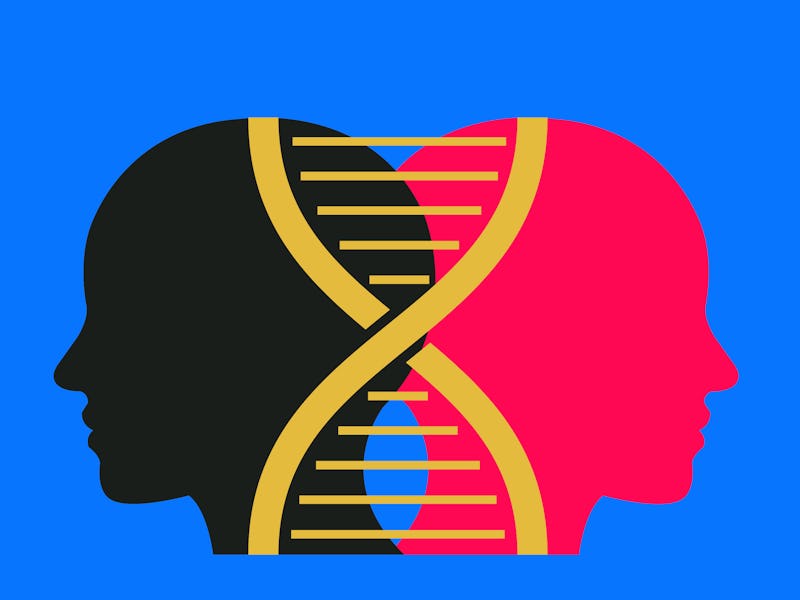Largest-ever study on genetics of anxiety points to new treatments
Identifying regions in the genome related to anxiety could pave the way to treatments that actually work.

The future of anxiety treatments could go the way of oncology and cardiology, as scientists inch closer to treating the condition using precision medicine — drug treatments that are specifically tailored to one’s genetic and biochemical profile. Anxiety is notoriously hard to treat using standard therapies, but a precision medicine approach promises to actually work.
But to know what genes to target using precision medicine, you have to know where to look. In the largest genetics study of its kind to date, scientists reveal regions in the human genome that appear directly related to anxiety risk — five are found in the genomes of Americans of European descent, and one in black Americans.
The findings were published this week in the American Journal of Psychiatry.
The researchers used data from nearly 200,000 participants in the United States’ Million Veteran Program — one of the world’s largest genetic biobanks. Daniel Levey, a postdoctoral associate at Yale School of Medicine and co-lead author of the study, described the dataset as “one of the greatest resources in the world for conducting this kind of research.”
"Genetics are an important piece of the puzzle for understanding human health.”
Levey tells Inverse that the study identifies the locations in the genome where genetic variation is common in most people. In turn, people who have variation in these locations have increased risk for anxiety symptoms.
But there’s a chance that people at a higher genetic risk for anxiety will not develop the disorder, Levey says.
“Genetics are an important piece of the puzzle for understanding human health, but they are not fate,” Levey says. “The variants we identified are responsible for an increase in overall risk, but that genetic risk interacts with other environmental and lifestyle factors.”
The human genome and anxiety
The team analyzed the genomes of 199,611 participants and looked at whether they had a self-reported diagnosis of anxiety or panic disorder.
In Americans of European descent, the researchers identified five locations on the human genome related to anxiety. The study is notable because it is may be the first to produce significant findings on the genetics of anxiety among people of African ancestry (about 18 percent of the participants were black). The identified region is at the TRPV6 gene — the genetic variant only occurs in people of African ancestry.
A risk region of particular interest is one near the gene SATB1, Levey says. This gene interacts with the hypothalamic-pituitary-adrenal axis, which is the biological pathway associated with the stress response. The result may point to a “novel understanding of how genetics influence the stress response and anxiety,” he says.
The findings jibe with the theory that the traits of some psychiatric conditions overlap because they share genetic roots. The researchers found high genetic overlap between anxiety symptoms and depression, post-traumatic stress disorder, and neuroticism.
The future of anxiety gene research
Historically, the genetics of anxiety disorders has lagged behind other related conditions, including depression. In 2018, scientists discovered that there are at least 82 genes linked to depression — in part explaining why 50 percent of cases are caused by genetics.
The authors of the 2018 study hoped that identifying genes could lead to new treatments. Levey shares the same hope: Other researchers can take what this study has accomplished, and expand upon the findings to develop novel therapies. There’s also a need for larger studies that can identifying “more of the genetic architecture underlying anxiety disorders,” he says.
“In the future, perhaps awareness of increased risk for anxiety disorders may lead people to seek out treatment and empower them to seek training in coping strategies to be more resilient,” Levey says.
Partial abstract:
Background: Anxiety disorders are common and often disabling. They are also frequently comorbid with other mental disorders such as major depressive disorder with which they may share commonalities in their underlying genetic architecture.
Methods: We used one of the largest homogeneously phenotyped cohorts available, the Million Veteran Program, to perform a genome-wide association study (GWAS) a continuous trait for anxiety (GAD-2, N=199,611) as the primary analysis and self-report of physician diagnosis of anxiety disorder (SR-ANX, N=224,330) as a secondary analysis).
Conclusions: We present the largest GWAS of anxiety traits to date. We identified novel genome-wide significant associations near genes involved with global regulation of gene expression (SATB1) and the estrogen receptor (ESR1). Additionally, we identified a locus (MAD1L1) which may have implications for genetic vulnerability across several psychiatric disorders. This work provides new insights into genetic risk mechanisms underpinning anxiety and related psychiatric disorders.